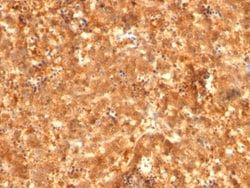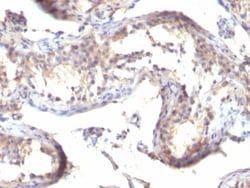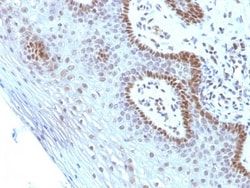TGF-alpha Antibody (TGFA/1119), Novus Biologicals™
Manufacturer: Fischer Scientific
The price for this product is unavailable. Please request a quote
Antigen
TGF-alpha
Classification
Monoclonal
Concentration
0.2mg/mL
Dilution
Flow Cytometry 0.5 - 1 ug/million cells in 0.1 ml, Immunohistochemistry-Paraffin 2 - 4ug/ml, Immunofluorescence 1 - 2 ug/ml
Gene Accession No.
P01135
Gene Symbols
TGFA
Immunogen
Recombinant human full-length TGF alpha protein
Quantity
0.2 mg
Research Discipline
Angiogenesis, Cell Cycle and Replication, Signal Transduction
Gene ID (Entrez)
7039
Target Species
Human
Form
Purified
Applications
Flow Cytometry, Immunohistochemistry (Paraffin), Immunofluorescence
Clone
TGFA/1119
Conjugate
Unconjugated
Formulation
10mM PBS and 0.05% BSA with 0.05% Sodium Azide
Gene Alias
protransforming growth factor alpha, TFGA, transforming growth factor, alpha, transforming growth factor-alpha
Host Species
Mouse
Purification Method
Protein A or G purified
Regulatory Status
RUO
Primary or Secondary
Primary
Test Specificity
This antibody reacts with the C-terminus of TGF alpha and shows no cross-reaction with EGF and the neuropeptide synenkephalin. TGF alpha (aa50) is a growth factor with 33% homology to EGF, binds to EGFR, activates tyrosine phosphorylation of the receptor, and stimulates cell proliferation. It plays a role in tumor initiation by inducing the reversible transformed phenotype.
Content And Storage
Store at 4C.
Isotype
IgG1 κ
Description
- Ensure accurate, reproducible results in Flow Cytometry, Immunohistochemistry (Paraffin), Immunofluorescence TGF-alpha Monoclonal specifically detects TGF-alpha in Human samples
- It is validated for Immunohistochemistry, Immunohistochemistry-Paraffin.




